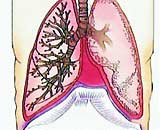Is hiccups sick?
Hiccups that occur only a few minutes to less than 24 hours usually do not affect health and do not require treatment. But if this phenomenon persists for more than 48 hours or recurring cyclical, it is usually due to illness.

Diaphragm contractions involuntarily, causing hiccups
Hiccups are an important reflex of the fetus while in the womb to prepare to operate the respiratory muscles for breathing immediately after birth. Infants have hiccups as soon as they are born and start breathing. Hiccups are also the reflex of the digestive system to prevent inhalation of amniotic fluid or only work to move food through the esophagus.
Hiccups are episodes of involuntary and intermittent contractions of the diaphragm due to sudden inhalation, sudden closure of the glottis. A hiccup usually lasts only a few minutes, but can last for hours or 1-2 days, even years. The frequency of hiccups varies from person to person, about 2 to 60 pieces per minute.
Hiccups from a few minutes to less than 24 hours are considered temporary hiccups , mainly because of stomach distress and irritation of the vagus nerve or diaphragm. Common causes are eating too fast, eating lots of hot or cold foods, spicy (chili), drinking lots of carbonated soft drinks), drinking a lot of alcohol . This is a common and common form of people normal, does not affect health and does not need treatment.
Hiccups that last more than 48 hours or cyclic recurrence often have an underlying disease or potential . This form is less common but it is very uncomfortable for patients and in the long term can seriously affect health such as depression, weight loss, insomnia, exhaustion . The damage affects the head and chest area or the abdomen can cause prolonged hiccups. Sleep hiccups can be caused by internal injuries; If it disappears when sleeping and reappears at waking, it may be psychological or idiopathic. Need medical examination and treatment.
Cure hiccups
Temporary hiccups usually disappear on their own after a short period of time and respond well to simple mechanical measures. The general purpose of these mechanical measures is to increase the concentration of CO2 in the blood or stimulate the vagus nerve to sever nerve impulses causing hiccups. It is possible to do 3-5 times each of the following measures or take measures at the same time:
- Hold your breath for a long time (with a pressure of less than 10 seconds); blow 10 long breaths into a paper bag (or breathe in the bag). This way increases CO2 in the blood.
- Swallow 1 tablespoon of vinegar or 1 tablespoon of dry sand, chew and swallow dry bread (with breath hold). This way stimulates the lining of the oropharynx.
- Frightened or startled suddenly.
- Pressing on the tongue, stimulating the tongue to stimulate the nerves - taste.
If hiccups are prolonged, you need to see a doctor for prescriptions.
Hiccups in children
Almost all healthy babies can get hiccups at any time, especially in the first months of life and will drop after 1 year. Hiccups in children often occur after eating, because the stomach is stretched by too much steam or food. In order to prevent this, mothers only need to feed their babies on time before they are too hungry and should not be too full.
In addition, hiccups in children may also be due to gastroesophageal reflux - esophagus, pneumonia or drug reaction.
There is usually no need to do anything when the baby is hiccups, except when the child is very uncomfortable or the hiccups last for more than 5-10 minutes. Pat or claw your back to burp or sip some sugar water (mix 1/2 teaspoon of sugar in 100 ml of water); or give the baby suck, suck something.
- Why hiccup?
- Video: The process of forming hiccups in humans.
- Small tips from hiccups right away
- How to cure hiccups immediately at home
- New equipment for effective hiccups
- Husband was beaten because his wife hiccuped
- Hiccups, watch out for cancer
- Simple tips to cure hiccups, nasal congestion very effectively
- Thinking you sick will make you sick
- The smart home knows that the owner is sick
- Body odor changes when near sick people
- Why are children and elderly people prone to getting sick?
 Green tea cleans teeth better than mouthwash?
Green tea cleans teeth better than mouthwash? Death kiss: This is why you should not let anyone kiss your baby's lips
Death kiss: This is why you should not let anyone kiss your baby's lips What is salmonellosis?
What is salmonellosis? Caution should be exercised when using aloe vera through eating and drinking
Caution should be exercised when using aloe vera through eating and drinking Scientists explain why we hiccup
Scientists explain why we hiccup  How to cure hiccups immediately at home
How to cure hiccups immediately at home  Why hiccup?
Why hiccup?  Husband was beaten because his wife hiccuped
Husband was beaten because his wife hiccuped  Video: The process of forming hiccups in humans.
Video: The process of forming hiccups in humans.  Small tips from hiccups right away
Small tips from hiccups right away 